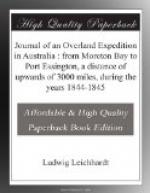Dec. 10.—We travelled about seven miles to the northward; but kept for the first three miles in a N.N.W. direction from our camp, when we came to a small plain, with a Mangrove creek going to the westward; scarcely two miles farther, we crossed a drooping tea-tree swamp, of which a Pandanus creek formed the outlet; and, two miles farther still, a large plain opened upon us, in which we saw a great number of natives occupied in burning the grass, and digging for roots. All the country intervening between the creeks and the plain was undulating stringy-bark forest. I left my companions in the shady belt of drooping tea-trees, and rode with Charley towards the natives, in order to obtain information. They were, however, only women and children, and they withdrew at my approach, although I had dismounted and left my horse far behind with Charley. They had, however, allowed me to come near enough to make them understand my incessant calls for “obeit,” water, adding occasionally “Balanda; very good; no good.” When they had disappeared in the forest, Charley came with the horse, and we reconnoitred along the boundaries of the plain to find water, but not succeeding, we returned; and, when opposite to the place where I had left my companions, I cooeed for them to come over to me. My cooee was answered by natives within the forest, and, shortly afterwards four men came running out of it, and approached us most familiarly. They spoke English tolerably, knew the pipe, tobacco, bread, rice, ponies, guns, etc.; and guided us to a fine lagoon, which I named after the leading man of their tribe, “Nyuall’s Lagoon.” Two of them promised to pilot us to Balanda and to “Rambal,” which meant houses. They were very confiding, and women and children entered for the first time freely into our camp.
They examined every thing, but made not the slightest attempt to rob us even of a trifle. When the women returned at night, they did not bring “Allamurr,” or, as it was here called, “Murnatt,” but plenty of “Imberbi,” the root of Convolvolus, which grow abundantly in the plain: they gave us a very seasonable supply of it, but would not taste our dried beef, which they turned, broke, smelled, and then with a feeling of pity and disgust returned to us. Nyuall gave an amusing account of our state: “You no bread, no flour, no rice, no backi—you no good! Balanda plenty bread, plenty flour, plenty rice, plenty backi! Balanda very good!”
He, Gnarrangan, and Carbaret, promised to go with us; and the first intended to take his wife with him. They imitated with surprising accuracy the noises of the various domesticated animals they had seen at the settlement; and it was amusing to hear the crowing of the cock, the cackling of the hens, the quacking of ducks, grunting of pigs, mewing of the cat, etc. evident proofs that these natives had been in Victoria.
A heavy thunder-storm passed over at 6 o’clock P. M. and the natives either crowded into my tent, or covered their backs with sheets of tea-tree bark, turning them to the storm, like a herd of horses or cattle surprised by a heavy shower in the middle of a plain. Imaru lay close to me during the night, and, in order to keep entire possession of my blanket, I had to allow him a tarpauling.




